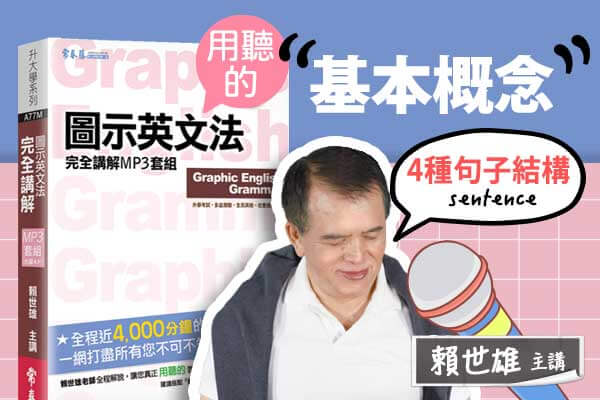
- 常春藤中外編輯群
- 發布於 Nov.29,2023

英文學習就像蓋房子一樣, 一磚一瓦, 一字一句。請密切鎖定每週一"賴老師"親自熱騰騰開講!
延伸閱讀 >> 解析文法【助動詞 - 3】
4. 句子(sentence):
英文的「句子」是由主詞(subject,略為S)和動詞(verb,略為V),外帶視情況需要的受詞、補語、修飾語或子句形成。英文的動詞需配合主詞的人稱、單複數及時間作變化。
主詞的形式有:
1 名詞作主詞
例: Money is not everything.
(金錢並非萬能。)
Time and tide wait for no man.
(歲月不待人。)
2 代名詞作主詞
例: She is very intelligent.
(她非常聰穎。)
It is up to you.
(這由你來決定。)
3 動名詞(片語)作主詞
例: Seeing is believing.
(眼見為信。)
Playing video games is my favorite pastime.
(打電動是我最喜歡的消遣。)
4 不定詞(片語)作主詞
例: For some people, to live is to suffer.
(對某些人而言,活著就是受罪。)
To become a millionaire is every American boy's dream.
(成為百萬富翁是每一個美國男孩的夢。)
5 the+形容詞 作主詞
例: The rich(具體人物) are not always happy.
(有錢的人們未必快樂。)
The sublime(抽象概念) is sure to inspire awe.
(崇高一定會使人敬畏。)
6 名詞片語(疑問詞+不定詞)作主詞
例: What to wear has been troubling her.
(她心裡一直煩惱要穿什麼才好。)
When to start is not decided yet.
(何時出發尚未決定。)
7 名詞子句作主詞
例: That the earth goes around the sun is known to everybody.
(地球繞行太陽眾所周知。)
Who(m) you'll marry is none of my business.
(你要跟誰結婚不干我的事。)
「句子」就像火車頭一樣,可以單獨使用。單獨使用的句子稱為「單句」(simple sentence)或獨立「子句」。句子也可連接另一個句子形成「合句」(compound sentence)。句子亦可加掛子句形成「複句」(complex sentence)。另外,一個「合句」再加上一個或多個子句則形成「複合句」(compound-complex sentence)。
1. 單句:由一個(或以上)主詞和一個(或以上)動詞形成,不含任何「從屬子句」或「對等子句」。
例: Robert likes classical music.
(勞勃喜歡古典音樂。)
Robert and his younger sister like classical music.
(勞勃和他的妹妹都喜歡古典音樂。)
Robert likes classical music and opera.
(勞勃喜歡古典音樂和歌劇。)
2. 合句:由對等連接詞 and,or,but 連接兩個「對等子句」形成。
例: Cindy wrote the music and I wrote the lyrics.
(辛蒂譜曲,我寫歌詞。)
Henry likes the mountains, but his wife prefers the seashore.
(亨利喜歡山上,而他老婆比較鍾情海邊。)

3. 複句:由一個主要子句和一(或多)個從屬子句形成。
例 : We had no idea(主要子句(火車頭)) why she kept crying(名詞子句(車廂)).
(我們不知道她為何一直哭。)
I know the person(主要子句(火車頭)) whom you mentioned(形容詞子句(車廂)) because he is a neighbor of mine(副詞子句(車廂)).
(我認識你提到的那個人,因為他是我的鄰居。)

4. 複合句:由一個合句連接一(或多)個從屬子句形成。
例 : She told me(主要子句(火車頭)) that she was innocent(名詞子句(車廂)), but I wouldn't believe it(主要子句(火車頭)).
(她告訴我說她是無辜的,可是我一直無法相信。)







